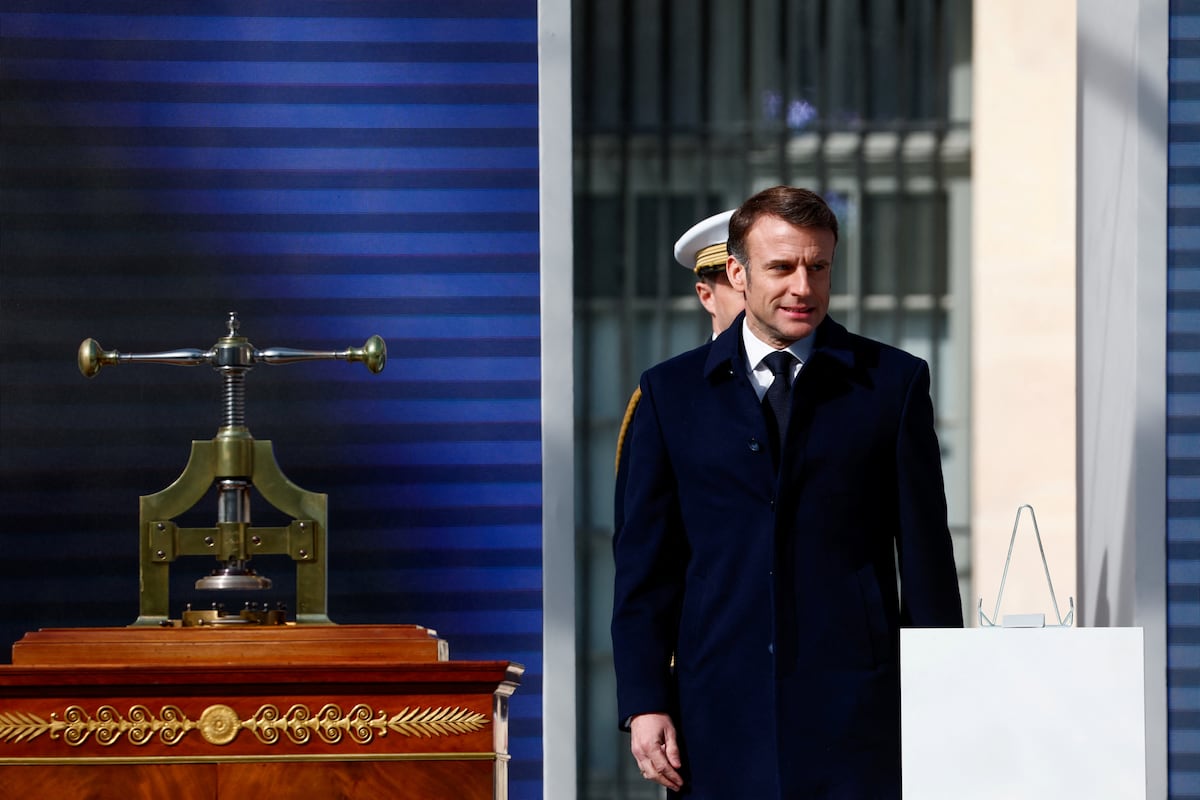The members of the PP who appealed to the Constitutional Court the abortion law of 2010. From left to right, Luis Peral, former senator;
Lourdes Méndez, now a deputy for Vox;
and José Eugenio Azpiroz, former deputy, in front of the court's façade last June CEDAWING TO EUROPA PRESS / Europa Press
The Constitutional Court plans to address the deliberation of the sentence on the abortion law, pending for 11 years, according to sources from the institution tell EL PAÍS. The delay in solving this matter has been denounced before the European Court of Human Rights (ECHR) by ex-PP deputies, who signed the appeal against the deadlines law - currently in force - 11 years ago, which allows abortion without alleging any reason within of the first 14 weeks of gestation. The Christian Lawyers Association also presented a complaint to the Supreme Court for "malicious delay" against magistrate Andrés Ollero, former PP deputy and in charge of writing the presentation of the future sentence.This complaint and the lawsuit before the European Court have caused the Constitutional Court to now study to reactivate the processing of the appeal to issue a sentence.
The president of the court, Juan José González Rivas, considers that there is no basis for these legal actions against the Constitutional Court and against Ollero to prosper, but also considers that the time has come to address the claim so that the plenary session can address the appeal that the PP presented in 2010. González Rivas has maintained permanent attention to this matter since his arrival to the presidency.
More information
Breaking the constitutional consensus
A constitutional ripped apart and in a state of alarm
The magistrate Andrés Ollero, consulted by this newspaper, explains that he has “prepared the necessary work” to take the presentation to the plenary as soon as González Rivas so decides. Ollero adds that, in any case, he has not received any indication or comment to expedite the presentation of the presentation, neither from the president nor from any of the members of the tribunal.
The dominant criterion among the consulted Constitutional magistrates is, however, that much more should not be expected and that it is necessary to put an end to the long waiting period on the PP's appeal.
Various members of the court have made no secret of their belief that it is an extraordinarily delicate matter, on which there may be serious difficulties in reaching a consensual judgment.
But all agree that it is the court's obligation to assume its responsibility and face debates of this nature.
The average resolution time for cases that reach the Constitutional Court is 133 days.
The PP's appeal against the 2010 abortion law has been unsolved for more than 4,000 days.
The demand of 20 ex-deputies of the PP before the European Court of Human Rights accuses the Constitutional Court of the "incomprehensible and arbitrary" delay in the processing of the appeal against the abortion law. The former popular parliamentarians - among them, Luis Peral, Lourdes Méndez and José Eugenio Azpiroz - recall in their letter that the Constitutional Court informed them in July 2010 that it gave "priority to the processing and resolution of the appeal", which it did not occur. In December 2020, these former deputies addressed the court demanding that the sentence be handed down, but received no response.
During the terms of the two previous presidents of the Constitutional Court, Pascual Sala and Francisco Pérez de los Cobos, no progress was made on this matter. "Neither my predecessor nor I", explained Pérez de los Cobos in an interview in
El Mundo
in 2014, "we have put this matter on the agenda for a reason of prudence." And he added: "Those who raised the appeal against the current law were the PP deputies, who now have an absolute parliamentary majority and who have repeatedly said that they are going to change the law and that, therefore, they have in their hand to ward off the problems of constitutionality that the norm posed ”.
The appeal of the PP challenged eight precepts and the second additional provision of the law of terms approved by the Government of the socialist José Luis Rodríguez Zapatero.
Among the precepts appealed was one of the main aspects of the law: the one that allowed abortion in the first 14 weeks by free decision of the mother.
The 1985 Doctrine
The PP understood then that the Constitutional doctrine, established in its ruling on the abortion law of 1985, only admitted to decriminalize the voluntary interruption of pregnancy when there was a serious danger to the life of the unborn and other assets and values of the mother. And they argued in their appeal that the new law of terms created a system by which the life of the unborn was completely unprotected in the first 14 weeks of gestation. The parliamentarians who registered the appeal before the Constitutional Court accused the Zapatero government of thus breaching article 15 of the Constitution, which reads: "Everyone has the right to life and physical and moral integrity."
In the debate on the constitutional text in 1978, the then deputy Manuel Fraga proposed and managed to change in article 15 the word "people" (the one born with 24 hours of life, according to the Civil Code) for the word "all", which supposedly it also included the unborn.
In this way, as Fraga would explain then, the door to legalizing abortion in Spain was closed.
When the Popular Party registered its appeal in the Constitutional Court, the president of the court entrusted the presentation to magistrate Elisa Pérez Vera, who drafted a text that considered the new 2010 abortion law fully constitutional, as she now explains to EL PAÍS for the first time .
But that presentation was never fully debated because the magistrate ended her term in 2012.
Contrary to voluntary termination of pregnancy
The magistrate Andrés Ollero, former spokesman for Justice of the PP in the Congress of Deputies, with deep religious convictions and against abortion, has been in charge since 2012 of the presentation of the sentence on the current law of voluntary interruption of pregnancy. Shortly before joining the Constitutional Court in 2012, Ollero wrote an article in Diario Médico in which he argued that the ruling of that court in 1985, which established certain conditions to be able to have an abortion, was being breached and that in fact free abortion existed in Spain : "Among those who neglected their protection and those who did not dare to protect them, the unborn have not won for scares," he said.
Various associations and parties demanded that Ollero renounce the presentation due to alleged incompatibility. But he accepted the commission considering that personal criteria cannot be incompatible, since everyone has one.
While he was writing his presentation, the Government of Mariano Rajoy was preparing his project to repeal the socialist deadline law, a project that did not succeed because Rajoy withdrew it in 2014. In the following years, the PP considered the possibility of withdrawing the challenge of Zapatero's law, something that was no longer legally possible, and his electoral programs no longer featured this issue. Despite this, the appeal was still alive without the Constitutional ruling ruling.
Ollero is one of the magistrates with the term expired since November 2019. The Constitutional Court now has a majority (seven to four) of magistrates elected at the proposal of the PP.
Within a year, if the pending and planned renovations are carried out, the majority will predictably move to the progressive sector.
Two laws and a threat
In a democracy, Spain has had two abortion laws - both with PSOE governments - and a third - with the PP - which was announced but never passed (although it did lead to a minor modification of the rule, referring to minors) .
This is the evolution of that legislation:
The first law of the PSOE: decriminalized assumptions. The first abortion law of democracy, the one approved by the Government of Felipe González and in force between 1985 and 2010, was not exactly a specific law: it was a text with a single article that was limited to modifying the Penal Code, introducing an article —The 417 bis— which decriminalized abortion in three cases: rape (alleged in the first 12 weeks), malformation of the fetus (until week 22) and serious risk to the physical or mental health of the woman (at any time). The last two required a medical report.
Zapatero's reform: a system of terms. The system of assumptions of 1985 (which the PP did not touch during its years of government) was replaced by one of terms in 2010, with President José Luis Rodríguez Zapatero and Minister of Equality Bibiana Aido. That law is the one in force today. It establishes that abortion is a right of the pregnant woman in the first 14 weeks: within that period, therefore, the woman does not have to allege any motive. Afterwards, it allows abortion until week 22 and after a medical report, due to "serious risk to the life or health of the mother or fetus." Thereafter, it can be aborted if the fetus suffers "extremely serious or incurable disease" or abnormalities incompatible with life. The pregnancy can also be terminated if there is a risk to the mother.
The return of Rajoy: paralyzed at the last moment. In December 2013, after two years of debate within the PP itself and four unsuccessful attempts, the Government of Mariano Rajoy approved its preliminary draft of the abortion law. The minister in charge was Alberto Ruiz-Gallardón, and the text represented a three-decade step back: it repealed the deadline system, the majority in Europe, and returned to the system of assumptions, but hardening it because it suppressed the assumption of fetal malformation. The possibility that a pregnant woman with a fetus with malformations aborted was not eliminated in practice, but she was forced to allege another reason (the psychological damage that she would suffer) and a long and complicated procedure was imposed to prove it. That law was never finally approved: Rajoy ended up withdrawing it and Gallardón resigned.
A one-off change for the minors. The Government of Rajoy did promptly reform the deadline law in 2015 to introduce the mandatory parental permission for young women aged 16 and 17 who want to have an abortion. The current PSOE-United We Can coalition government has shown its intention to repeal that article.







/cloudfront-eu-central-1.images.arcpublishing.com/prisa/OCS7V4Q6YKB6UMI76BXPPNGQJE.jpg)







